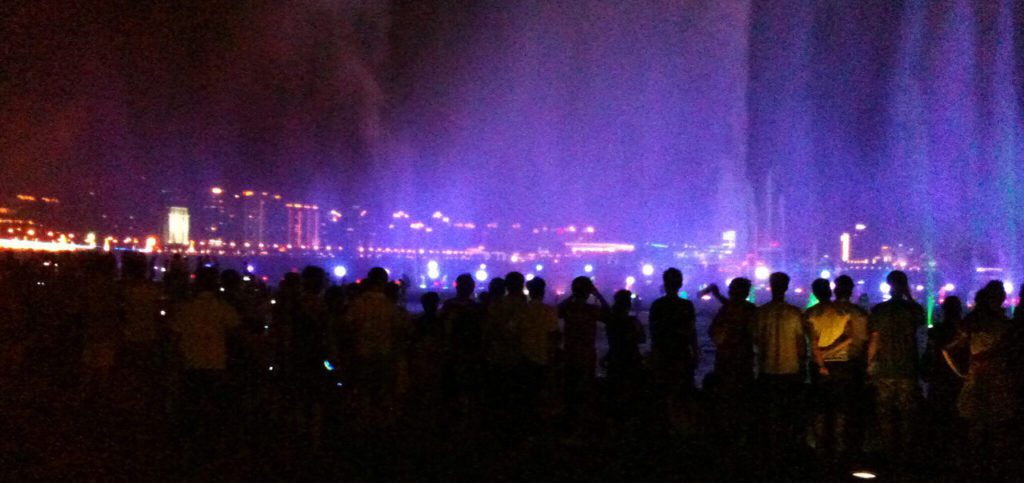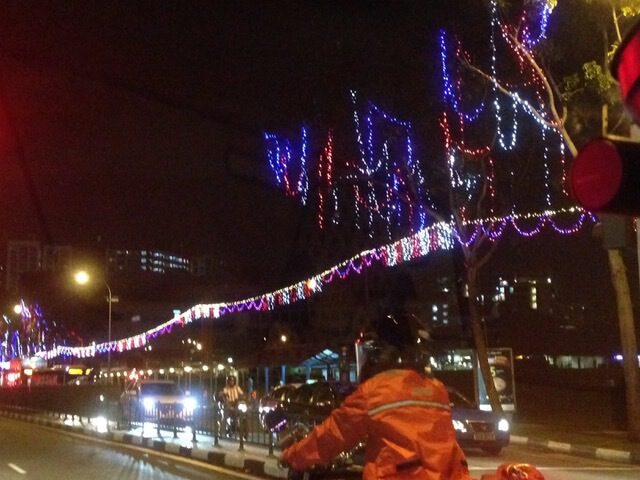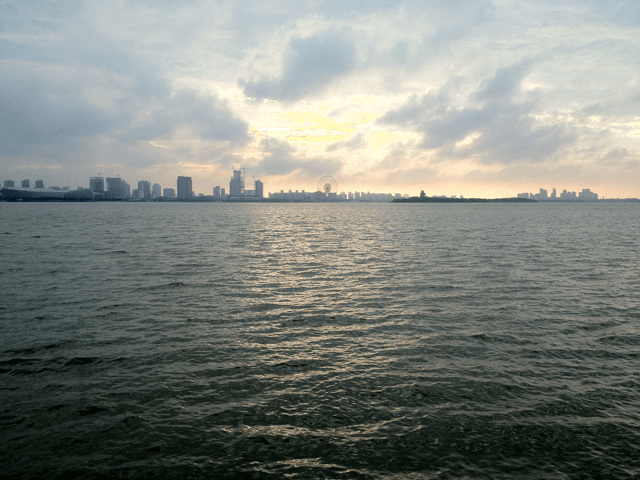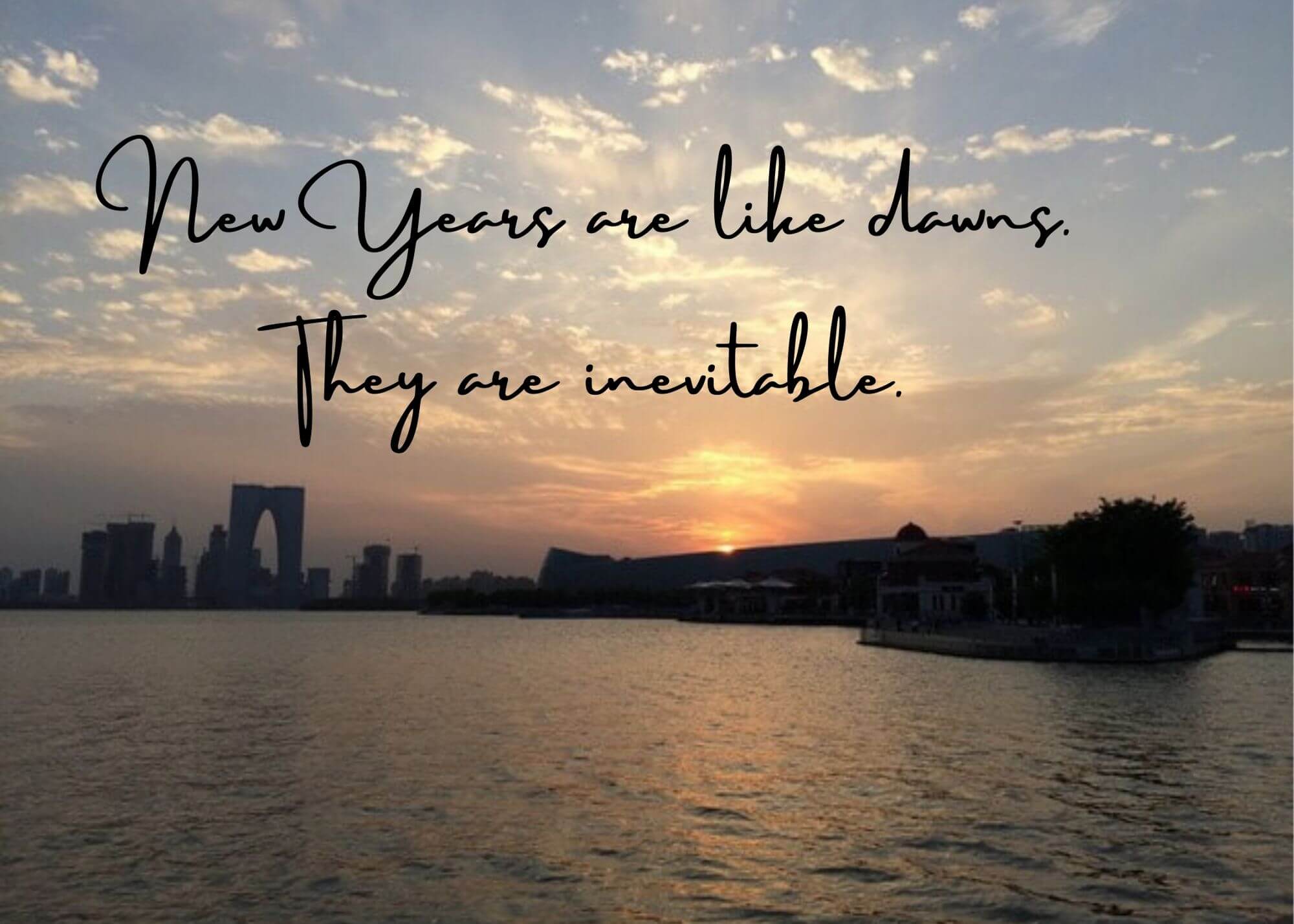In the ninth part of the In the Land of the Dragons (ILD), Mitali tells us about New Year celebrations, an indoor waterfall, and her interactions with Amitabh Ghosh. An exclusive for Different Truths.

One year, on the first day of the New Year in Suzhou, we had an indoor waterfall from the ceiling of our master bedroom’s bathroom that cascaded and gushed in exuberance.
I always hope for magic on the first day of the New Year. This time maybe a miracle will happen in 2021 — and, perhaps, abracadabra — the pandemic will disappear quietly just as it had appeared! Can that happen?
New Years are like dawns. They are inevitable. An eternal optimist like me always hopes for the best at each fresh start.
New Years are like dawns. They are inevitable. An eternal optimist like me always hopes for the best at each fresh start. A new year, a new day or a new birth continues to be a source for a sense of exhilaration like the colours of sunrise.
Each New year is welcomed worldwide with celebrations — even in China though it slips up on religious holidays. In Suzhou, a fresh year is welcomed with fireworks and crowds.
We lived right by the place which would be one of the centres of such celebrations. That year, we decided to escape the crowds thronging the day of January 1st to visit Shanghai, only a little more than an hour’s drive. Our home was near Jinji Lake1 which was a tourist spot and heavily crowded on holidays. Sometimes, it was so crowded that our car had to stand in a jam for hours to make it to our doorway. There were times when we just walked home, leaving the driver with the car. In any case, the car stayed with him at night and we used the garage for other things and not for housing the car. That day — I cannot recall about the crowds — what has survived is the memory of the waterfall.
We opened the bathroom door to discover, there was a huge waterfall in the bathroom falling from the ceiling to the floor. It spilled out of the false ceiling in an unbroken spate and overran the bathtub and fell onto the floor.
When we returned home in the evening, and entered our bungalow, we could hear a strange gurgling and splashing sound. We climbed the stairs to our master bedroom. The sounds grew louder. It seemed to be coming from the bathroom. We opened the bathroom door to discover, there was a huge waterfall in the bathroom falling from the ceiling to the floor. It spilled out of the false ceiling in an unbroken spate and overran the bathtub and fell onto the floor. An amazing site to see — like the Niagara Falls!
We went to call the security. It was a gated property, and the security was always available, even on holidays. They were assigned to settle “emergencies” on official holidays in the compound to the best of their abilities. The security guard came and saw. He declared there was a ‘typhoon’ in the bathroom and the most he could do was to turn off the water.
Then, how would we stay in the house without water? It was a holiday — how would we get help. We could not even contact our relocation agents who were supposed to contact the landlord to sort out these issues for expats like us. It was January 1st. We decided to negotiate with the landlord directly. The landlord was kind, especially when we told him that we could go to a hotel and he could send the worker the next day. He would, of course, need to pay for our hotel stay.
The landlord, a major builder in Shanghai, had a plumber in within half an hour. Looked like a pipe had burst. The plumber fixed it that night itself. They returned the next day to paint the ceiling! The speed and efficiency were outstanding!
Given the scale of the waterfall, the memory of other things like a huge crowd on the drive home fades almost to a redundancy at the back of the mind.
Given the scale of the waterfall, the memory of other things like a huge crowd on the drive home fades almost to a redundancy at the back of the mind. But I do recall, during holidays, the lane leading to our home would be jammed for hours and we could hear the honking well into the night. Which was why we had escaped to Shanghai. That and the intrusive and inquisitive crowd that never seemed to get enough of watching laowais (foreigners) and their homes.
The huge park near our home around the lake would be swarming with people. It would be almost impossible for us to enjoy the musical fountain show with laser lights on festive evenings. When we lived in flats, we could see the crowds — like a sea of heads. In the bungalows, we could hear the honks.

Occasionally, they would wander into our patio and peer through the French windows to watch foreigners!
In the first bungalow, the local population would come for tours. There would be a tour guide with a flag showing them around. Occasionally, they would wander into our patio and peer through the French windows to watch foreigners! In the second bungalow, they would walk into my garden and enjoy the fishpond! We were objects of curiosity and novelty to them as much as a new city or a tourist attraction. You can see them in Singapore too — sometimes in the university or tourist spots but thankfully, never near our compounds.
The surprising thing was in China very few of the local population seemed to have a sense of private property or privacy. Occasionally our outdoor chairs or the water hose would go missing from the bungalow. Eventually, we would find them abandoned in the lost and found of our compound, but we did not take them back. Most of the time, we bought the replacements ourselves. My housekeeper told me in the past, during Mao’s regime, they did not bother to lock doors because no one had anything worthy of being stolen. That is why all property was regarded as common. They just wanted to satisfy their curiosity about us or the world around them, outside of China. After all, it had been a closed country for centuries.
I wanted to call the police, but the driver drove away from the scene to ‘safety’. He spoke rapidly to Aditya who explained to me that the robbers were from the province of Xingjiang. They moved in hordes and killed cold bloodedly…
However, once when I left my handphone in a KFC outlet, the manager called up the last number I had called, and I had a hurried call from the friend to go and retrieve my mobile. The only time I faced theft in Suzhou was near an electronic mall. Someone else was getting robbed I noticed while I waited in the car for my husband to return. I wanted to call the police, but the driver drove away from the scene to ‘safety’. He spoke rapidly to Aditya who explained to me that the robbers were from the province of Xingjiang2. They moved in hordes and killed cold bloodedly anyone who reported them. So, technically the driver saved us. This is the same province which is regarded as abused by most of the Western media.
We spent all our eight years in China in four different rented homes around Jinji Hu. Jinji Hu had an ‘interesting’ story3 attached to it. A golden rooster, jinji in Mandarin, fell out of nowhere on a boat that was sailing in the lake, thus etching itself in the future with its name. However, one of my drivers told me a story which sounded more authentic. He said he had lived in a hutment in the same area as a child. Evidently, the lake grew out of a marshland which had been peopled by locals who were not rich. They were given money by the government to move to new homes in the main town. The people obliged and most of the local residents were paid enough to have a couple of flats to their name. They were happy to move as they had money — a commodity that is necessary to survive.
I found the outlook of the Chinese amazingly pragmatic in some matters. I remember one winter when Suzhou was very polluted, I asked my driver — all of them had had basic schooling — why they allowed polluting industries in China — after all the factories were largely responsible for the haze. And he answered because they generate jobs, and we need jobs to eat.
Eating and breathing are both basic functions. To be forced to prioritise one over the other seemed a reaffirmation of the dearth and poverty that had become intrinsic to the lives of the have nots.
Wow! Eating and breathing are both basic functions. To be forced to prioritise one over the other seemed a reaffirmation of the dearth and poverty that had become intrinsic to the lives of the have nots. I do remember reading about the Red Army and the poverty during Mao’s regime in the Ping-Pong Diplomacy by Nicholas Griffin4. The scenario painted there in those times left a deep imprint. Nobel Laureate Pearl S Buck5 also tried to depict the gaps in her novels. But one just wonders, how many countries did face these deficits at different points in history and how did the people respond? Did they also opt to breathe bad air to access food and money?
The USA and the UK too had suffered smog from industrialisation in the 1940s and 1950s6. So much so that 4000 people died in London, in 1952, from such a haze. These countries have been working for many years towards clean energy after unintentionally initiating the environmental issues that plague Asia and other parts of the world now. I wonder if the Western polluting industries died down completely or moved their business elsewhere? How long will Asia take to move towards clean energy?

New Year had always been a time when in China the cold was starting to stiffen. Most of the expats would be in their home countries. But we decided it was a good time for us to enjoy the sites within the country as opposed to going back to India or Singapore. Flights were overbooked and hotels crowded in India too at that time. We opted to go to India during the Chinese New Year holidays. And that was a sound choice. Because that was when all the local population wanted to return home to celebrate with their families. As a result, all services actually got suspended — which would mean repairing the broken pipe in the bathroom, my landlord and the plumber might have taken days to respond. I wonder if in case of such a breakdown in India or in the USA during Diwali, Christmas or Thanksgiving, what would happen? Would the local workers rush to repair the damage?
Typically, the expats who stayed back during Chinese New Year to savour the festivities would complain about lack of services.
Typically, the expats who stayed back during Chinese New Year to savour the festivities would complain about lack of services. We liked to travel within India at that time as most Indians would be back to work. That was the time we travelled with our families to Jaipur, Ajanta Ellora, Agra, Calcutta and more places — whichever took our fancy! Dehradun and Delhi, where we had to visit our immediate families, would be beautiful and abloom with flowers at this time. The winter would be fading into spring and my mother’s garden at the foothill of the Himalayas would be rife with flowers and birds. And they had this cat, which adopted our home but was not adopted by us. My sons spent hours watching it and savouring the garden. They would pick vegetables grown organically for my mother to cook and we would gaze at the majestic Himalayas and sip endless cups of tea and coffee.
But as all good things come to an end, our trips in February ceased with our leaving China.
Post New Year, our sons’ friends would start returning and some amount of visiting and playdates would commence. I loved this time for the quietness and the flowers in my garden, for the time spent well with my sons and husband and for the lovely holidays which became a reality as we tried to do most of our travelling within China in December. January, my husband would often be touring and my children readying themselves for their second and final semester in school. Their exams were in May-June, a time we were all very busy and when the mothers in school were preparing for the largest Charity fair in Suzhou, hosted by the school and parent volunteers. The charity, other than hosting sporting events like dunking teachers with balloons and water, face painting, wall climbing, fencing provided a link between all the cultures that the school hosted in its student community. We would have food stalls, a concert and tables set up for vendors from all over Suzhou and Shanghai displaying and selling their wares. It was a colourful event and one which initially had seemed crowded to me. After I got involved in the organisation, it was a time to develop friendships and uncover more world cultures.
I remember an American expat … volunteered me to invite Amitabh Ghosh for dinner to my home!
The first year, I was involved in a big way with this charity, I remember an American expat — an ex-professor who told me that in US Universities, women for a long time were paid lesser than men — volunteered me to invite Amitabh Ghosh for dinner to my home! The telling is getting involved now. I must start from the beginning.
This professor, let us name her Ann for convenience, was a member of a book club run by an expat bookshop owner. They would invite authors from all over the world to meet and greet expats and locals. We frequented the bookshop and the little cafe in it, but we never went for these book club events. Ann did. And she volunteered me without checking if I would be willing to host the writer.
I had a past history, which Ghosh professed to have forgotten — not very flattering for me. When I was in Delhi University, I had been shortlisted for the Inlaks7 interview. I had a confirmed admission in the University of East Anglia and Ghosh turned down my scholarship telling me — I could teach creative writing. At 21 or 22? Just because I was writing for newspapers and had been in an anthology — that was bizarre. He was very direct. He told me I probably just wanted to travel. It was the truth! He had seen through my ruse. But who likes to be told the truth like this?
I told Ann the story — and she disappeared. Then I went to give notice at the bookshop. They said I was too late and had to volunteer. It was the only Western bookstore which had good books in Suzhou. I did not want to have its doors shut permanently on me. So, I went with my driver to pick up Ghosh, albeit a trifle cross and reluctant.
I invited two die-hard Ghosh fans on the school faculty to have dinner with him. I am not a fan of Ghosh.
There were two of us appointed to entertain him. I had spoken to the other volunteer earlier. She had agreed to a dinner in my home. I had wanted Ghosh to visit the school instead, but the bookshop told me contractually that was out. So, I invited two die-hard Ghosh fans on the school faculty to have dinner with him. I am not a fan of Ghosh. I think he writes well but I have never been bowled over by the content of his novels
Ghosh said he did not want to come home when I went to pick him up. I told him I would not do what he wanted — trapeze around lanes of Suzhou with him in the evening. In any case, I had googled and found he was located in the US at that point and, therefore, had cooked a sumptuous Indian meal for him. He was appalled! He said he was living in India. I told him he should have updated his website then and he had no choice. The guy who had organised the outing was aghast! He could not imagine anyone talking to Ghosh, the hallowed, as directly as I was. Well, the end result was Ghosh came to my house.
Ghosh downed a whole lot of white wine. It came to a point where my husband had to turn on his charms.
I cannot remember much more about the visit. My husband said I was incredibly rude. Ghosh gave weird answers to the fans. I was very irritated and spent most of the time in the dining area attending to the meal talking loudly to my children and the guests. Ghosh downed a whole lot of white wine. It came to a point where my husband had to turn on his charms. My husband, a most non-literary nerd, found commonality by talking of his late grand uncle who had taught Ghosh. Ghosh and he conversed with enthusiasm. I had been very fond of my husband’s grand uncle who was incredibly kind to me. But I could not be good to his student even for the sake of his memory. I would describe the visit briefly as such: He came. He irritated. He drank. He left.

My sincere hope is Ghosh would have forgotten the dinner party just as he had lost all memory of my Inlaks interview.
Looking back, I think he just wanted to be left alone and not treated as an author or a VIP — I mean if I were visiting a place, I would want to walk around and not visit a bizarre person from my country. But here he was forced into a situation he probably wanted as less as me. Sometimes it is lovely to be left alone in anonymity with words and a new town. That is how he might have felt in all justification.
Famous people have never really been my cup of tea.
Famous people have never really been my cup of tea. I still remember Aditya’s response after shaking hands with the President of Singapore, a very friendly gentleman called Mr Nathan8, at a ceremony. The next day, full six years old Aditya was asked by his class teacher, “So, what did you think of the President?”
And Aditya answered. “He is botha.” Botha means bald in Malay — the President had thin hair — the kind of baldness that developed in men at a certain age. But Aditya’s observation was absolutely honest. He treated the man like a human and not as the chair.
I have never understood the need to associate with the famous. To me, they are just humans like you or me. I am very happy to be a homemaker and mom who writes for fun and dreams of reaching out to readers with hope. In this case, hope for a fabulous new year — 2021.

References:
1 https://www.wendyweitours.com/jinji-lake.html
2 https://www.cfr.org/backgrounder/chinas-repression-uighurs-xinjiang
3 https://www.china-travel-guide.net/attraction/suzhou/jinji-lake/
4 https://nicholasgriffin.com/book/ping-pong-diplomacy/
5 https://www.english.upenn.edu/Projects/Buck/biography.html
6 https://www.aqmd.gov/home/research/publications/50-years-of-progress
7 https://www.inlaksfoundation.org/scholarships/
8 https://www.istana.gov.sg/The-President/Former-Presidents
Photos by the author and visuals by Different Truths





 By
By
 By
By

 By
By
Wonderful narration… informative too…enjoyed reading it a lot!!
